Constipation from New Foods: What to do for Your Baby
- What are the normal, run of the mill changes you can expect to see in your baby's poop and how the consistency, frequency and volume of bowel movements change too when you start solid foods
- The signs and symptoms of constipation, including the difference between problematic constipation that requires an intervention vs. typical, run-of-the mill constipation that will literally work itself out!
- Safe interventions and treatments you can implement if your baby needs some special foods or suppositories on occasion because of constipation.
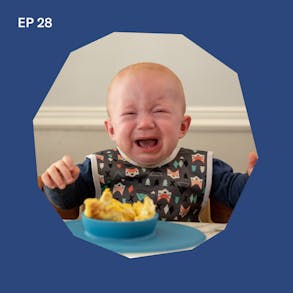
LISTEN TO THIS EPISODE
Episode Description
- What are the normal, run of the mill changes you can expect to see in your baby’s poop and how the consistency, frequency and volume of bowel movements change too when you start solid foods
- The signs and symptoms of constipation, including the difference between problematic constipation that requires an intervention vs. typical, run-of-the mill constipation that will literally work itself out!
Links from this Episode
- Listen to Episode 5 where I give my tips on how to start BLW and how to transition into solid foods.
- Listen to Episode 24 where I dive into water and whether or not your baby needs to be drinking it.
- Listen to the latest Purees + BLW with SLP Feeding Expert Dawn Winkelmann, MS, CCC-SLP, where we discuss how purees fit into BLW.
- CHECK OUT the TINY CUP from ezpz for open cup practice with your baby age 6 months+; adding a little more fluid (preferably breastmilk and/or formula) can help with constipation. Get 10% off at ezpzfun.com with code KATIE10.
- Baby-Led Weaning with Katie Ferraro program with the 100 First Foods™ Daily Meal Plan, join here: https://babyledweaning.co/program
- Baby-Led Weaning for Beginners free online workshop with 100 First Foods™ list to all attendees, register here: https://babyledweaning.co/baby-led-weaning-for-beginners

Latest Episodes
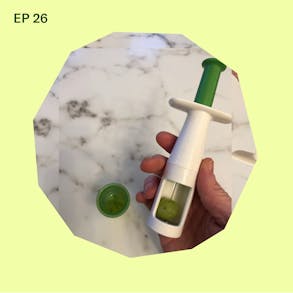
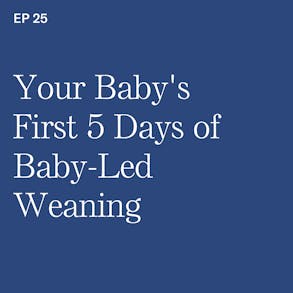

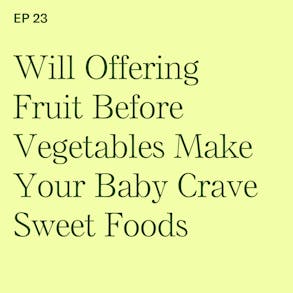
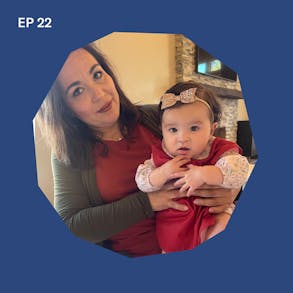
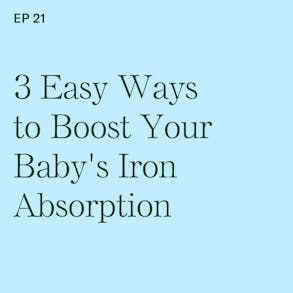
Katie Ferraro (1s):
So this mom was concerned because the baby who usually has a bowel movement every day in the morning had gone four days straight without a bowel movement. Was that a concern or was that just the typical constipation that we experience as our babies are starting solid foods? Hey there, I'm Katie Ferraro, Registered Dietitian, college nutrition professor, and mama of seven specializing in baby-led weaning. Here on the Baby-Led Weaning Made Easy podcast I help you strip out all of the noise and nonsense about feeding, leaving you with the competence and knowledge you need to give your baby a safe start to solid foods using baby-led weaning.
Katie Ferraro (44s):
Hey guys, welcome back to another episode of the Baby-Led Weaning Made Easy Podcast. I'm your host, Katie Ferraro. I'm a registered dietitian and mom of seven specializing in baby-led weaning. And today we're talking about constipation. Now I know it is incredibly weird to be listening to a podcast about constipation, but when your baby's trying new foods, constipation is going to happen. Let's talk about what we need to do for it, and also a little bit about what we don't need to do for it. So as I do with every episode, I want to start you guys out with a baby-led weaning tip of the day. This one is regarding gut health. Now, sometimes parents worry with things like constipation, that the constipation is an indicator that your baby can't digest, or shouldn't be eating a certain food or food group.
Katie Ferraro (1m 33s):
But I want to remind you guys in the American academy of pediatrics reminds us as well that the infant gastrointestinal tract is able to digest and efficiently absorb virtually all nutrients by the age of two to three months. So therefore it follows that by the time complimentary feeding is recommended, which of course is at six months or later, there are no foods that you need to avoid on the basis of gastrointestinal tract immaturity. Okay? So again, your baby can absorb all of these nutrients from foods as early as two to three months. Of course we don't feed our baby solid food at two to three months because it's not safe, but just know that there's no things you need to hold off on.
Katie Ferraro (2m 13s):
Sometimes parents will say, oh, I heard I shouldn't feed my baby meat or certain types of grains or certain types of legumes because they can't quote unquote digest it. That's not true. So yes, we do see changes when we start solid foods. We're human beings, especially as parents, you know, we fear change. So if your baby's constipated, I want you to hang tight because in this episode, I'm going to give you a number of tips about interventions that you can safely implement, including a really easy apple prune puree recipe that you can make at home to safely feed your baby if he or she is constipated. Cause you'll learn in today's episode foods like apples and pears and prunes, they contain sorbitol, which is a type of sugar alcohol that really helps get things going in your gut.
Katie Ferraro (2m 59s):
But of course, apples, pears, and prunes, their intact state are not safe to feed. So I'm going to show you how to make this puree that you can then put on a preloaded spoon and have your baby self. So again, we can honor the principles of baby-led weaning, which is promoting self feeding, but at the same time, we can be feeding our babies foods that are safe. So if you guys are worried about constipation, I want you to know you are not alone. Okay, today we're going to talk about what's normal for babies regarding their bowel movements, what constipation is and what are some signs and symptoms of them. And then what are some treatments or interventions that we can do on occasion when necessary? But I'm hoping what most of you will leave with today is okay what my baby is experiencing is just typical run of the mill constipation.
Katie Ferraro (3m 44s):
And there's no real reason for concern. So let's go ahead and dive in talking about first what's normal regarding babies in bowel movements. So normal stooling patterns will vary from infant to infant. Okay? And they're going to change with dietary patterns. So you might say, oh, my older baby didn't have this, or another baby, that's my baby's ages and experiencing this. But please remember that the gut is a highly, highly individualized thing, right? The way our guts behave is different from person to person and the same holds true with your baby. So for infants who have been breastfed or who are being fed a hydrolyzed infant formula, typically they're going to have between one and two bowel movements a day.
Katie Ferraro (4m 25s):
Now that tends to be more than infants who are on cow's milk or soy milk based formulas. So generally kind of the general rule of thumb, if you look at the literature, is that breastfed babies have sometimes on average, twice as many bowel movements per day as formula fed babies. So constipation tends to be more rare in breastfed infants. Sometimes why those exclusively breastfed babies and their moms are like a little bit more taken aback by the changes that come on when you start solid foods that around six months of age, because they might've never experienced constipation prior to that, it tends to be a little bit more common in babies who are formula fed. Okay. So constipation across the board, just so you know is fairly normal.
Katie Ferraro (5m 7s):
Okay. Just because your baby is having less frequent bowel movements, when you start solid foods does not necessarily mean that there's a problem. Okay. There are signs of constipation though, that we want to just be on the lookout for. So if your baby has hard or pebble or pellet like stools. So for example, if they're having hard stools repeatedly, and it's not followed by a soft bowel movement, that's a problem. Usually hard stool, hard stool, huge soft blowout, okay. Or two or three hard stools before that. But the point is, if it's not followed by that soft bowel movement, that's a reason for concern. Now, if the bowel movement is accompanied by pain or difficulty in passing where the baby is clearly wrenching and crying and in agony, yes.
Katie Ferraro (5m 50s):
That's something we want to be concerned about, but a little bit of straining, especially when we start solid foods is to be expected. Okay. So having frequent bowel movements is sometimes listed as a sign of constipation and that can be misleading and a little bit confusing. Okay. So again, just keep in mind that there is typical constipation and then there's problematic constipation. So let's talk about when constipation really is a problem. Okay? If your baby has repeated hard or pebble or pellet, like stool that are not followed by a BM, if they're constantly in pain, if the baby ever has blood in the stool, okay. That's something that you would want to alert the pediatrician to. Now one aside, I know a lot of you guys are trying, you know, a hundred different foods with your baby before they turn one.
Katie Ferraro (6m 34s):
Sometimes we see remnants of the food in the stool and parents freak out. Does that mean my baby can't handle it? No, certainly not just like your baby is getting all of those other muscle systems working and learning and singing in unison as they're learning to eat, the same is happening with the gut. So it is fairly typical to see pieces of intact food in your baby's stool. Don't freak out about that. If you do see color. And oftentimes when the stool is darker, we think, oh my gosh, it's blood. There are certain foods that will have that effect. So for example, think about beets whenever you feed your baby beets out, always forget that we ate beets. I personally don't love beats. So I feel like I tried to mentally block it out. And then like a day later, the baby's stool would be bright red.
Katie Ferraro (7m 15s):
And I was like, oh my gosh, there's blood in the stool. No, it's just the side effects that remnants from eating the very, you know, darkly colored beets, certain foods you may be trying will result in, changes in stool or asparagus is another one. It changes the smell of the urine, right? You guys know that if you eat asparagus, our bodies don't break down the particular amino acid So we end up smelling it. When we go to the bathroom, you'll smell that in your baby's diaper. And you're like, oh my gosh, what's wrong. Sometimes the foods that the baby eats will have effects on stool as well as urine. Okay. But if there's real blood in there, that is a reason for concern, but you don't need to be concerned if your baby is a little bit constipated, but then follows up with a big blowout or a soft bowel movement.
Katie Ferraro (7m 58s):
Another thing too, as, as your baby gets more active. So usually when you start foods, your baby is six months of age. They're not crawling around, but in the next few months, they start crawling around more activity, decreases constipation. We know that for adults, right? I remember I used to work in adult weight management. And we always said to adults who are constipated, there's usually one of three problems. If you're constipated as an adult, you're either not getting enough fiber, not getting enough fluid or not getting enough activity. And for most Americans eating a standard American diet, north Americans, Western societies, we sit in front of a computer all day. We don't eat very much fiber and we don't drink enough fluid. Okay? The same goes for your baby before they're very active. They sometimes are more constipated.
Katie Ferraro (8m 39s):
Of course we can't go make the babies exercise, but just note that as your baby starts crawling more, you'll notice less constipation. Secondly, we don't want to feel the baby up with too much fluid, but if your baby is stay hydrated or not getting enough fluid. So in some cases it may be that the formula is improperly reconstituted. There's not enough water that could potentially lead to constipation, but we don't want to offer the baby too much excess water. If you haven't already listened to it, go check out episode number 24. I did a whole podcast episode about water when to offer your baby water and how much you want to make sure that you're not offering too much water and water as a thin liquid can be challenging for earlier babies to drink safely, especially just when they're starting out.
Katie Ferraro (9m 21s):
What about interventions? Okay. I always like to share stories of other parents are kind of going through maybe the same thing that you are right now. And there's a mom. I was chatting with recently named Paige. She said, my little one is always constipated. She's 10 months. And I offer pear and prune puree with oats, hemp, seeds, chia, and flax seeds every morning and water in the day. Not sure if it's helping. Okay. I'm always constipated. Like if there's never a relief as never a soft bowel movement, there's always pain and difficulty. I mean, it's hard to tell sometimes when you're chatting back and forth exactly what the level of constipation is. But if it's, if it's something that you would consider to be always a problem, that is something that I would consider then reaching out and talking to your pediatrician about and always documenting, right.
Katie Ferraro (10m 4s):
One person says always, and then if you wrote it down, it might mean, oh, well, every other day she has a soft bowel movement. That might just be your baby's new normal. If you wrote it down and you're like this, baby's not having bowel movements for longer than seven days and I'm documenting it. Okay. That's a different story. So again, I think documenting things, especially if you're trying to keep a log, if you're going to go to your pediatrician, listen, it's been more than six days, seven days. And this is a baby that used to have a stool every other day, et cetera, documenting can be helpful. So that was Paige's situation. As far as doing the prune in the apple periods. I think that's a great idea. I'll share a recipe with you guys in a second. I'm adding hemp seeds and chia and flax seeds. So those seeds can absorb some water to some degree and they can make the stool bulkier and the concept or the idea there is that it would then be easier to pass.
Katie Ferraro (10m 49s):
But sometimes doing too much of those kinds of added fiber foods can have the opposite effect. And if there's not enough fluid in there, it can actually make the baby more constipated. So I don't recommend things like chia and flax seeds routinely or regularly for babies. If they're constipated, I think it's more important to look at the underlying situation. If there is potentially something going on, we don't just want to be treating it with certain foods every single day. Now on occasion, we might need to do juice or we might need to do a puree to kind of get things going. And that's okay. Another mom, Jackie was telling me recently, my eight month old hasn't gone in almost a week. Okay. But showing no signs of discomfort, I think I'm going to try some prune puree tomorrow, or maybe a little bit of juice.
Katie Ferraro (11m 32s):
And I was saying to Jackie, I think that that's a good approach because the treatments and the interventions that I want to talk about next are things that we use sometimes. So for example, a suppository, if you call your pediatrician and your baby has constipation, I remember one time with my last two twins, they're in babies, number six and seven Gus and Hannah. They were really routine when they started solid foods, a couple of like four or five days, Gus, he didn't have a bowel movement. His belly was getting bigger and bigger and bigger. And this was a kid who always slept through the night. And at around like seven months of age, one night, he was crying in the middle of the night, clearly in pain with his stomach. I was like, what is going on? Like, oh my gosh, he hasn't had a bowel movement in a long time. Like this kid has clearly constipated call the pediatrician.
Katie Ferraro (12m 14s):
The recommendation is just to do a glycerin suppository. He said, oh, I'm sure you have some glycerin suppositories on hand. And I was like, oh, of course I don't. And it's the middle of the night. So my husband went to the pharmacy, got a suppository. Again, these should be reserved for occasional and not regular use. But I really wished I had had some on hand because it took an extra hour to watch this little guy really, really suffer. And then literally like right after 15 minutes after the depository cleared everything out and everything was fine. So having those glycerin suppositories on hand is helpful. You don't want to use them all of the time, but they're nice. Cause a lot of times when you call your pediatrician, if you're talking about constipation, they're going to tell you to do that. Anyway, the American academy of pediatrics recommends against the use of mineral oil, stimulant, laxatives, or enemas for instant constipation, but a glycerin is depository here and then here and there rather can really be your best friend.
Katie Ferraro (13m 4s):
If you are experiencing this, especially early on in feeding. Now what about fruit juice? Okay. This is another intervention. Again, you guys are probably aware that the American academy of pediatrics advises against juice before age one, babies definitely don't need juice, but it is okay to use juice in small amounts if you're treating constipation on occasion. So the juices that naturally contain sorbitol, which are the most useful for getting things going in the baby's gut, those juices include apple juice, pear juice, and prune juice. Now for four to eight month old babies, we do between two and four ounces a day. So find a hundred percent fruit juice, either apple pear or prune do two to four ounces.
Katie Ferraro (13m 49s):
If you're maybe four to eight months for babies who are eight to 12 months, you can do up to six ounces of a hundred percent fruit juice per day. But again, just reiterating, this is something to do on occasion. We're not recommending regular use of juice, but it's not the end of the world. If you need to give your baby a little juice every now and then another mom I was talking to Divya was telling me, okay, my little one usually poops every day in the morning for the record. I love how open parents are to just like talking about bowel movements with other adults. When it's about their child. My little one usually poops every day in the morning, Divya says, but recently he was constipated and the baby didn't poop for four days straight. She said the next day he was crying really bad and pushing.
Katie Ferraro (14m 32s):
He ended up having a huge soft bowel movement and everything went back to his routine after that. But she was pretty stressed there cause it was four days and people say, you know, how long should I let my baby go? I always advise parents go with your gut on that one. Like if your baby's clearly in pain and it's been significantly longer than what your baby usually does, that might be a time look into one of these interventions. So you can do this depository as you can do fruit juice, apple prune, or pear juice on occasion. Now there's also a number of food fixes. Okay? So things like I mentioned, the prune, the pears or the apples, you could make them safely into a puree and then preload a spoon hand, dear baby, allow your baby to self feed that apple pear or prune puree.
Katie Ferraro (15m 18s):
Okay. You can do purees very safely and in line with baby-led weaning provided that you're not the one putting the spoon into your baby's mouth. Okay? So if you can allow your baby to feed that puree using the preloaded spoon technique in that way, you can honor and uphold the principles of baby-led weaning and self feeding, but still incorporate a period because of course it's not safe to feed babies hard or raw apples, pears, or prunes. Now, if you're not familiar with the whole preloaded spoon approach, go back to episode number four, it's called how to do purees for a few days when starting solid foods. And that podcast episode, I kind of outline the whole preloaded spoon approach and how to teach your baby right self feed using a baby-led weaning spoon.
Katie Ferraro (16m 6s):
And the spoon that I like for baby-led weaning is called the tiny spoon. That's from the company, ezpz. If you go to their website, ezpzfun.com. The tiny spoon is the one that is for babies. Six to 12 months of age, it was designed by their feeding expert, Dawn Winkelmann. She was just on the podcast as well in a bonus episode, talking about how to incorporate purees with baby-led weaning. She's a speech language pathologist and feeding expert. That's a bonus. All of these episodes are linked up on my podcast website BLW podcast.com. Dawn designed the tiny spoon for ezpz. You can get 10% off all of the ezpz products if you use the code, Katie 10. So Katie one zero. So again, you can do those purees.
Katie Ferraro (16m 45s):
If you want to bran is oftentimes cited as another food fix. You know, when we think of brand, I mean, I don't know about you there's I just think bran muffins come to mind. You want to be careful with bran muffins because bran muffins are really bran cake, right? Muffins for the most part have so much added sugar that they're totally not appropriate for babies to eat, especially early on. So bran muffins might be a constipation solution, but we don't want to get in the habit of feeding our babies high sugar foods, which bran muffins are. If you have been using white rice cereal, for example, iron-fortified rice cereal, which to be honest, most people who do baby-led weaning skip that.
Katie Ferraro (17m 26s):
But some parents like, okay, I did a lot of rice cereal before I discovered baby-led weaning. You want to just switch off of a low fiber cereal, like white rice cereal switch to a whole grain. If you're doing cereals, ideally you would be pre-loading the spoon and allowing your baby to self feed those cereals versus you putting the spoon in the baby's mouth. Some other parents say that things like sweet potato purees are cooked, soft apples, cooked dates, again, prunes, purees, pear, purees. These things can be helpful if you are experiencing constipation with your baby. No, I've got a great recipe for an apple prune puree.
Katie Ferraro (18m 7s):
It's on a blog post that I did about constipation. If you want to grab it, that recipe, just go to the show notes for this episode. And I'll link out to that really easy to make it's something. I actually use the leftover apple prune puree. I use it as like a jelly. So for my older kids, they love peanut butter and jelly, but I don't like to feed them regular jelly with so much added sugar. So I'll actually use this same recipe, that apple prune puree recipe with peanut butter, almond butter, if we're doing sandwiches for them. So parents inevitably will ask them, okay, fiber plays a role in constipation and how much fiber should my baby be having. We want to be careful not to overdo it on fiber. Don't go out and start buying like double fiber bread or high fiber yogurt.
Katie Ferraro (18m 48s):
A lot of those products, they're kind of diet products for adults, right? They're supposed to make you feel fuller for longer with the fiber keeping you full. So you're not hungry and you don't eat. We don't want to make our babies feel artificially full by pumping them full of high fiber foods that aren't naturally high in fiber. Instead just incorporate some fruits and some vegetables, some whole grains and some legumes where you can throughout your baby's diet. Okay. And your baby will naturally get enough fiber. So there's no adequate intake level set for fiber for babies under age one. Okay. But there is an adequate intake level for ages one to three it's around 19 grams of fiber a day. Okay. So a piece of fruit, if you want to ballpark, it is four or five grams of fiber.
Katie Ferraro (19m 29s):
As your child gets older and becomes a toddler. If you can serve a number of servings of fruits and vegetables, plus some whole grains and a little bit of the plant foods, like the legumes in there, which are good sources of fiber, your baby can easily get the 19 grams, but I don't recommend keeping track and counting. How many grams of fiber your baby is eating. Just keeping track of your baby's bowel movements though is ideal and know that some degree of constipation is going to be expected as you start solid foods. Most of the time it's typical, but hopefully now, you know, a little bit more about when it's a concern. If you're interested in more of this kind of nutrition related side of starting solids, I have a quick start guide to baby-led weaning.
Katie Ferraro (20m 12s):
It's a 16 page e-book, that's packed with pretty much everything you need to know about getting a safe start to solid foods, but also ensuring that your baby is incorporating the right nutrition. Because of course, if you feed too much refined carbohydrate, your baby will be constipated. So how do we strike that balance of helping our babies learn how to eat, but feeding foods that are safe I think you'll like the quick-start guide. So the quick start guide for baby-led weaning again, it's a 16 page e-book, I'm going to link to that in the show notes. This episode, hope you guys enjoyed learning a little bit about constipation and hopefully put your mind at ease that most of the time, the constipation, your baby's experiencing resolves itself on its own.
Katie Ferraro (20m 53s):
And you don't have to do any, you know, earth shaking interventions, but there's a few tips in today's episode. And again, everything's outlined for you on the show notes at blwpodcast.com. Thanks for being here guys. Bye now!

The Program Baby-Led Weaning with Katie Ferraro
A step-by-step digital program for starting solid foods safely and navigating the original 100 FIRST FOODS™ meal plan with baby-led weaning.
 EXPERT-LED, PROVEN APPROACH TO EATING REAL FOOD
EXPERT-LED, PROVEN APPROACH TO EATING REAL FOOD CONCISE VIDEO TRAININGS TO MASTER BABY-LED WEANING
CONCISE VIDEO TRAININGS TO MASTER BABY-LED WEANING 100 FIRST FOODS DAILY MEAL PLAN WITH FOOD PREP VIDEOS
100 FIRST FOODS DAILY MEAL PLAN WITH FOOD PREP VIDEOS
Baby-Led Weaning for Beginners Free Workshop
Is your baby ready to start solid foods, but you’re not sure where to start? Get ready to give your baby a solid foundation to a lifetime of loving real food…even if you’re feeling overwhelmed or confused about this next stage of infant feeding.
Get baby-led weaning recipes and tips delivered to your email inbox.


